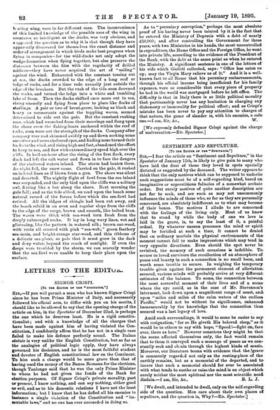LETTERS TO THE EDITUJ1.
SIGNOR CR I S PI.
[To THZ EDITOR OF THZ " SPRCTATOR:11 SIR,—If you will permit a man who has known Signor Crispi since he has been Prime Minister of Italy, and necessarily followed his official acts, to differ with you on his merits, I should like to be allowed to say that the opening charge of the article on him, in the Spectator of December 22nd, is perhaps the one which he deserves least. He is a rigid constitu- tionalist; and with a knowledge of all the charges that have been made against him of having violated the Con- stitution, I confidently affirm that he has not in a single case failed to make his defence perfectly sound. The Italian statuto is very unlike the English Constitution, but so far as the analogies of political logic apply, they have always governed his decisions, and he is the most faithful student and devotee of English constitutional law on the Continent. To him such a charge would be more grave than that of having used the money of the Banco. Romana for the elections, though Tanlongo said that he was the only Prime Minister to whom he had not given the funds of the Bank for election purposes. Of Signor Crispi's private morality, past or present, I know nothing, and can say nothing, either good or evil, and as to his domestic relations I have not the least information; but I know that he has defied all his enemies to instance a single viula.tion of the Constitution and "im- mutable laws," and no one has ever succeeded in doing so. As to "pecuniary corruption," perhaps the most absolute,. proof of his having never been tainted by it is the fact that he entered the Ministry of Depretis with a debt of nearly 210,000; and after controlling the Government for three years, with two Ministries in his hands, the most uncontrolled' in expenditure, the Home Office and the Foreign Office, he went into private life, according to the evidence of the President of the Bank, with the debt at the same point as when he entered the Ministry. A significant sentence in one of the letters of his wife which Giolitti collected, says: "Office has eaten us. up; may the Virgin Mary relieve us of it." And it is a well- known fact to all Rome that his pecuniary embarrassments, through his official income being insufficient for his family expenses, were so considerable that every piece of property he had in the world was mortgaged before he left office. The difficulty is that in Italy there is so little political morality that partisanship never has any hesitation in charging any dishonesty or immorality for political effect ; and as Crispi's mistake has been never to pay any attention to charges of that nature, the game of slander is, with his enemies, a safe,
[We expressly defended Signor Crispi against the charge of malversation.—En. Spectator.]


































 Previous page
Previous page